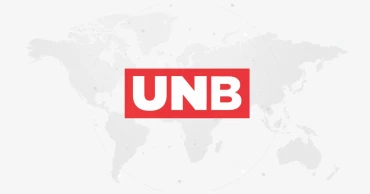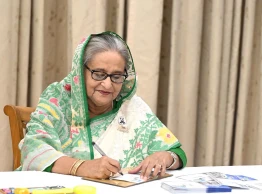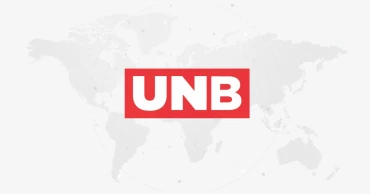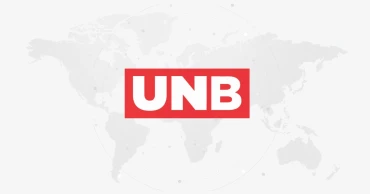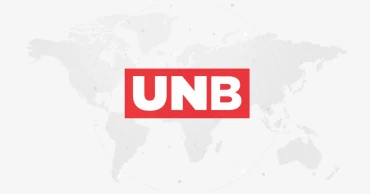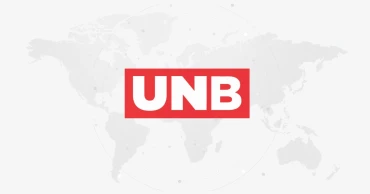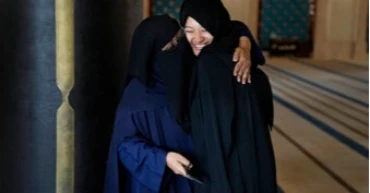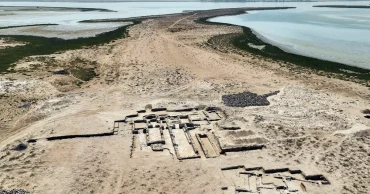Islam
Shab-e-Barat to be observed on Feb 3
Holy Shab-e-Barat will be observed on the night of February 3 as the Shaban moon was not sighted in the country on Monday.
As the moon was not sighted the holy month of Shaban will begin from January 21 and Shab-e-Barat will be observed on February 3.
The decision was taken at a meeting of the National Moon Sighting Committee held at Islamic Foundation’s Baitul Mukarram office in the evening, with secretary of Religious Affairs Ministry Kamal Uddin.
Holy Shab-e-Barat observed with religious fervour
The announcement was made after analysing data collected from the district administrations, Islamic Foundation, Bangladesh Meteorological Department, and Space Research and Remote Sensing Institute.
Shab-e-Barat is observed on the 15th night of the Arabic month of Shaban. Muslims offer special prayers, recite the Quran and take part in other religious rituals on the occasion.
1 month ago
Lessons of Qurbani: What does the Holy Eid-ul-Azha Sacrifice Teach Us?
Qurbani is an important religious practice for Muslims to demonstrate their devotion to Allah. In Islam, Qurbani means sacrificing something special, that is approved by religious laws, in Allah’s name for divine blessings.
Qurbani, also known as Eid-ul-Adha/ Eid-ul-Azha or the ‘Festival of Sacrifice’, honors the remarkable story of Prophet Ibrahim and his act of obedience to Allah, serving as a testament to faith and devotion in Islam. This holy occasion is celebrated annually by Muslims around the world, signifying unity, compassion, and willingness to make sacrifices for the sake of Allah.
9 Teachings of Qurbani in Eid-ul-Adha
This auspicious occasion remembers the unwavering faith and obedience of Prophet Ibrahim to Allah’s command. At the heart of this festival lies the act of Qurbani, which teaches us valuable lessons about faith, devotion, and selflessness. Let’s explore the profound lessons of Qurbani in Eid-ul-Adha.
Obedience to Allah
The story of Prophet Ibrahim teaches us that it’s most important to do what Allah asks us to do without questioning it. We should trust that Allah knows what’s best for us and have faith in His plans, even when things are tough.
Read more: Top 5 Eid-Ul-Azha, Animal Market Games for Android, iOS
Sacrifice and Selflessness
Qurbani teaches us about sacrifice and selflessness. It shows us that it’s important to let go of our own wants and think about what others need. During Eid-ul-Adha, we sacrifice an animal to understand the meaning of giving up something valuable for the benefit of others.
During Qurban Eid, when Muslims sacrifice animals, their main goal is to cleanse their souls and get rid of negative feelings like greed, resentment, and hatred. It’s a way for them to purify themselves spiritually and focus on kindness, generosity, and love toward others.
Gratitude and Thankfulness
When we participate in Qurbani, we are reminded of the many blessings given to us by Allah. It encourages us to be thankful for the abundance He provides us with, and helps us realize the importance of appreciating the blessings we have in our lives.
Compassion and Charity
Qurbani is about being kind and helping people who are in need. It teaches us that it’s important to share the blessings in our lives with others and give to those who don’t have as much as we do.
Read more: 10 Most Hyped Bangladeshi Movies Releasing on Eid-ul-Azha 2023
When we show compassion, we can offer comfort and inspiration to people near us and even far away. We have the power to give useful advice and guidance to those who need it, using our understanding and kindness, to make them feel better. We can share our good luck and love not just with our family and friends but also with strangers and those who need our help.
2 years ago
Not up to us to decide who will go to heaven and who will go to hell: PM Hasina
Prime Minister Sheikh Hasina today urged all religious-minded people, including Aleem and Ulema, to remain vigilant so that no one could tarnish the image of Islam.
“Let’s ensure that our sacred religion is not tarnished through various means. Aleem, Ulema and religious-minded people must keep an eye on this issue,” she said.
The prime minister said this while inaugurating 50 more model mosques and Islamic cultural centres across the country – in the fourth phase – joining virtually from her official residence Ganabhaban.
She said that Islam is the religion of peace, and those engaged in terrorism and militancy are tarnishing the image of this religion of peace.
“They are on the wrong path. All of us have to pay special attention to this matter,” she said.
The PM said that the last judgement will be made by the Almighty Allah.
“Who believes in Islam and who does not, we cannot decide that. It is very regrettable that sometimes we see some people unnecessarily trying to undermine other religions or different mazhab (sects) of Islam,” Sheikh Hasina said.
She said that this is against the lessons of Islam and ideology of the Prophet (PBUH). “This kind of attitude is not acceptable. Allah will judge everyone and everything… Allah will decide who will go to heaven and who will go to hell.”
Everyone will perform rituals of their own religion, and it is stated in the constitution of Bangladesh, she said.
“One cannot go to heaven by killing people. Killing innocent people will lead one to land in the fire of hell… People must be aware of this,” the PM said.
She said that all, irrespective of religion and background, gave their blood to attain the independence of the country.
“Everyone will perform their religious rituals, maintaining communal harmony. We run our country keeping faith in Allah. Everyone has equal rights and we believe that,” she said.
Terming militancy and terrorism as menaces of society, she said that these take away lives and misguide people. “Steps must be taken to keep people away from these menaces.”
She urged Aleems, Ulemas and Khatibs to be vigilant as sometimes quarters with vested interest misguide impressionable children to the wrong path.
“We cannot let children get involved in terrorism. Islam’s messages of peace and values must be ingrained in them,” she said.
She also asked all to remain alert regarding rumours, corruption, and repression of the weak. In this connection, she requested the imams to deliver special Khutba during Jummah prayers.
Regarding the establishment of model mosques, the prime minister said that her government has constructed the mosques so that people can follow the right path of Islam, and can learn more and understand the true essence of Islam.
Mentioning that Father of the Nation Bangabandhu Sheikh Mujibur Rahman was dedicated to the religion, she highlighted different actions taken by him for the cause of Islam, such as establishing Islamic Foundation, buying a ship named “Hizbul Hagar” for transportation of Hajj pilgrims, taking measures to organise Bishwa Ijtema in Bangladesh and allocating land in Tongi for it, giving land for Kakrail Mosque and Baitul Muqarram National Mosque, introducing recitation from Quran on BTV and Bangladesh Betar, and introduced holiday on Eid-e-Miladunnabi etc.
Earlier at Ganabhaban, Prime Minister Sheikh Hasina released commemorative postage stamps and a first day cover inscribed with the picture of model mosques on the occasion of the construction of a total 564 model mosques and Islamic cultural centers, covering all districts and upazilas of the country.
A documentary on the model mosques and Islamic cultural centres was screened at the function.
Regarding the establishment of model mosques, the prime minister said that her government has constructed the mosques so that people can follow the right path of Islam, and could know and understand the essence of Islam accurately.
Saying that Father of the Nation Bangabandhu Sheikh Mujibur Rahman was dedicated to the religion, she highlighted his government's steps in promotion of Islam.
She mentioned the establishment of Islamic Foundation, purchase of a ship named “Hijbul Hagar” for transportation of Hajj pilgrims, took measure to organise Bishwa Ijtema in Bangladesh and allocated land in Tongi for it, gave land to Kakrail Mosque and Baitul Muqarram National Mosque, introduced Quaran Telwat in BTV and Betar, introduced holiday on Eid-e-Miladunnabi.
Earlier at Ganabhaban, PM Hasina released commemorative postage stamps and first day cover inscribed with the picture of model mosques on the occasion of the construction of a total of 564 model mosques and Islamic cultural centers in each district and upazila of the country.
A video-documentary on the model mosques and Islamic cultural centres was screened at the function.
With State Minister for Religious Affairs Md Faridul Haque Khan in the chair, secretary of the ministry Kazi Enamul Hassan delivered welcome address at the function.
Prime Minister’s Principal Secretary Md Tofazzel Hossain Miah moderated the programme.
With State Minister for Religious Affairs Md Faridul Haque Khan in the chair, secretary of the ministry Kazi Enamul Hassan delivered welcome address at the function.
Prime Minister’s Principal Secretary Md Tofazzel Hossain Miah moderated the programme.
2 years ago
Ramadan Preparation Checklist: Tips to prepare for the holy month
The holy month of Ramadan starts with the appearance of the new moon and brings blessings to Muslims worldwide. Greeting each other with Ramadanul Mubarak or Ramadan Kareem, Muslims welcome this month. Fasting begins with Sahur and ends with Iftar. As devoted Muslims fast for 29-30 days continuously, they need to take some preparations for Ramadan. Let’s find out some tips to prepare for Ramadan.
Ramadan's Meaning and significance
Ramadan is the ninth month of the Islamic calendar which is very promising and holy. The holy Quran is the supreme religious scripture for Muslims in Islam. Muslims believe this holy book is a revelation from Allah (God). According to the holy Quran, Fasting (Roza) during Ramadan is mandatory for each adult and healthy Muslim.
According to Islam, fasting or Roza is the practice of abstaining from all kinds of foods, drinks, smoking, and sexual activity for some period. During the holy month of Ramadan, Muslims observe fasting or Roza every day from dawn (before the Fazr prayer) to the Maghrib prayer time. And, the Muslim devotees will be rewarded by almighty Allah for enduring the pain of thirst and hunger during fasting.
Read More: Ready for Ramadan? How to Prepare Your Body for Fasting?
In Ramadan, besides fasting, Muslims offer prayers to Allah in Salat, read passages from the holy Quran, donate to charity, and maintain a good lifestyle.
10 Useful Tips to Prepare For Holy Ramadan
Finish All Pending Fasts
If anyone has any pending fast which was missed in the previous Ramadan, she or he needs to complete that first. When someone is unable to complete the pending fastings due to some reasons like pregnancy, travel, sickness, etc., then it is imperative for that person to pay Fidyah as compensation for not fasting.
Fidya or Fidyah system is a kind of donation that must be paid through feeding the poor for not making up fasts missed in the last Ramadan on time.
Create a Ramadan To-Do List
As preparation for Ramadan, an individual can write down everything he or she needs to do for his or her own self or own family. The list can also include things he or she wishes to do for needy people. The checklist may include plans for donation, shopping, food processing, cleaning, etc.
Read More: Ramadan 2023: Govt sets office timing from 9 am to 3:30 pm
Processing of Raw Food Ingredients
During cooking diverse kinds of ingredients are applied like onion paste, ginger paste, chili paste, etc. These raw ingredients can be preserved in the freezer for months. Preparations of these raw ingredients at home need time and effort. Making this preparation in advance can save an individual valuable time and energy during fasting hours.
Maintain Nutritious Diet
During the holy month of Ramadan, devoted Muslims fast (Roza) from dawn to dusk. Fasting throughout the whole of Ramadan is a challenge for both mind and body. It is essential to maintain a well-balanced diet before and during Ramadan.
Maintaining a balanced diet can help to keep blood sugar normal and supply energy. Consulting with a doctor or nutritionist, whole grains, fresh fruits, vegetables, milk, yogurt, eggs, nuts, etc should be added to the regular diet to prepare the body for Ramadan fasting.
Read More: Lessons of Ramadan: What does the holy month teach us?
Donate Clothes and Goods
Ramadan is the month when many devoted Muslims do charity which is a great way to help others. It would be nice to arrange clothes and other items for donation and start the holy month with a little act of kindness.
2 years ago
Ctg Shahi Jame Masjid Bill 2023 passes in parliament
Chattogram Shahi Jame Masjid Bill 2023 was passed in parliament on Monday, aiming to upgrade the mosque into a center that can play an important role in preaching and proliferation of Islam in this area.
State Minister for Religious Affairs M Faridul Haque Khan moved the nill in the House and it was passed by voice votes.
The mosque was built in 1667 during Mughal rule.
The bill will replace the Chittagong Shahi Jame Masjid Ordinance 1986 which was promulgated during the military regime.
Read moe: Parliament passes new national budget by voice vote
It will provide for better management and maintenance of the Shahi Jame Masjid in Chattogram.
Any person who wrongfully obtains possession of or retains, or, having in his possession, custody or control, wrongfully withholds, any asset or property acquired, or transferred to and vested in the foundation, under this proposed law, shall be punishable with imprisonment for a term which may extend to two years, or with fine, or with both.
3 years ago
Militancy dishonouring Islam instead of dignifying it: PM Hasina
Prime Minister Sheikh Hasina today called upon Alem and Olama (Islamic scholars) to instil humanitarian values among people and guide them against terrorism, militancy and drug addiction.
“These are destroying families and the society as well,” she said while virtually inaugurating 50 more model mosques across the country from her official residence Ganabhaban.
She also requested all, particularly the children, not to get involved in militancy, saying, “Militancy is dishonouring Islam instead of dignifying it.”
Sheikh Hasina urged the guardians and teachers of educational institutions to be cautious as children and youths are targeted by militants.
“We can develop our society in a beautiful manner by erasing miseducation, differences, conflicts, terrorism, and militancy through realising the true sense of Islam,” she said.
The prime minister said that through the model mosques and Islamic cultural centres, people would get true knowledge on Islamic values and culture.
This will help in not being misled in the name of religion, alongside contributing immensely to stop terrorism, militancy and repression on women, she added.
Also read; PM Hasina urges affluent section to stand by destitute people
She said that the government has undertaken the projects of constructing model mosques so that no one can mislead people in the name of Islam.
The PM said the model mosques would enhance people’s knowledge of Islam – a religion of peace, fraternity and friendship.
“It would help stop terrorism, militancy and repression on women, with imparting the true knowledge of Islamic values and culture on people,” she said.
Describing the Alem and Olama as the “Orasatul Ambia”, she said people of the country respect the Khatibs and Imams of mosques.
“Make sure that none can mislead people using our religion. You can educate people to refrain from getting involved in social ills that include drug addiction, child marriage, repression of women, food adulteration and corruption through your daily sermons and khutba during Jummah,” she said.
Also read; AL always fulfills election pledges made to the nation: PM Hasina
She said religion cannot be used as a political weapon.
“Our target is to put an end to torture and repression, using religion,” she said.
The PM said Islam ensures free exercise of religions by people of all faiths.
“Irrespective of political identity and opinion, we can build a developed, prosperous and ‘Smart Bangladesh’ – with equal respect to every religion and with the non-communal spirit,” she said.
Sheikh Hasina said that Awami League has always been a “servant of Islam”, and Father of the Nation Bangabandhu Sheikh Mujibur Rahman stopped racing, gambling and alcohol sales.
She mentioned that Bangabandhu established madrasa board, allocated land for Baitul Mukarram Mosque and Ijtema ground – to uphold Islam.
“Bangabandhu had taken initiatives to hold Bishwa Ijtema in Bangladesh and incorporate the country as a member of the OIC,” she said.
Following the ideals of the Father of the Nation, she said they have taken various programmes to dignify Islam that includes constructing 564 model mosques at each of the upazilas and districts.
The prime minister said that she has so far opened 100 model mosques across the country while the rest will be opened in phases.
The government is now building three storey model mosques and Islamic cultural centres in every upazila and four storey mosque in every district.
State Minister for Religious Affairs Ministry Md Faridul Haque Khan and its Secretary Kazi Enamul Hassan spoke at the function from the Osmani Memorial Auditorium.
Rajshahi, Shariatpur and Chouddagram of Cumilla district sites were also connected to the programme, where the local lawmakers, public representatives, political parties, government officers and common people were present.
A video-documentary on the model mosques and Islamic cultural centres was screened at the function.
3 years ago
PM inaugurates 50 more model mosques to disseminate the essence of Islam
Prime Minister Sheikh Hasina today inaugurated 50 model mosques along with Islamic cultural centres, in the second phase.
She inaugurated the mosques — located in different parts of the country — joining virtually from her official residence Ganabhaban.
Read more: PM Hasina urges affluent section to stand by destitute people
According to ministry information, the mosques and Islamic cultural centres are located at Bhanga upazila and Nagarkanda in Faridpur; Kapasia in Gazipur; Sadar upazila in Gopalganj; Sadar upazila, Katiadi in Kishoreganj; Gior upazila, Saturia in Manikganj; Sadar upazila, Monohardi in Narsingdi; Goalanda upazila in Rajbari; District headquarters, Bhedarganj upazila in Shariatpur; Dhunot upazila, Nondigram in Bogra; Niamatpur upazila in Naogaon; Baraigram upazila in Natore; Sadar upazila in Chapainawabganj; Bhangura and Sujanagar upazila in Pabna; Kazipur in Sirajganj; Rajshahi City Corporation; Gangachara and Kaunia in Rangpur; Sadar upazila in Thakurgaon; Sadar upazila in Sherpur; District headquarters in Pirojpur; Sadar upazila and Kasba in Brahmanbaria; Sadar upazila and Manikchari in Khagrachhari; Chandina and Chauddagram in Comilla; Rupsha in Khulna; Khoksa and Bheramara in Kushtia; District headquarters and Gangni in Meherpur; Debhata in Satkhira; Gowainghat in Sylhet; District headquarters and Jagannathpur in Sunamganj; and Chunarughat in Habiganj district.
These model mosques include separate places for ablution and prayers, and are air-conditioned.
Besides, there will be registration and training arrangements for Hajj pilgrims, Imam training centre, research centre and Islamic library, corner for people with special needs, place for burial ritual, car parking facility, hifzakhana, pre-primary education and Quran learning arrangement, conference room for Islamic cultural activities and Islamic dawat, Islamic books sales centre, boarding facility for local and foreign guests along with the mosques.
Earlier, on June 10, 2021, Prime Minister Sheikh Hasina inaugurated the first phase of 50 model mosques, out of total 564, simultaneously across the country, aimed at preaching the true messages of Islam and to eliminate religious misconceptions.
Read more: AL always fulfills election pledges made to the nation: PM Hasina
The purpose of the project is enhancing Islamic brotherhood and its values as well as disseminating the essence of Islam against extremism and militancy.
Under category A, some 69 four-storey mosques with the elevator facility and a floor space of 2,360.09 square metres each are being constructed in 64 districts and city corporation areas.
Under category B, 475 mosques are being built with a floor space of 1680.14 square metres each, while 16 mosques under C category in coastal areas will have a floor space of 2,052.12 square metres each.
3 years ago
Qatar offers World Cup visitors an introduction to Islam
Fatima Garcia donned a headscarf and a black abaya — a long, loose-fitting robe — over her clothes as she walked into a mosque in Doha to learn about Islam.
In Qatar to enjoy the World Cup with friends, the Salvadoran visitor took a day off from soccer to go sightseeing at the Katara mosque, where preachers have been introducing Islam in multiple languages to curious fans from around the world.
“Qatar is my first exposure to Islam,” Garcia said inside the house of prayer, also known as the blue mosque for its beautiful turquoise tiles. “Qatar has been a life-changing adventure because it gives you a perspective on different cultures.”
Hundreds of thousands of visitors have come to Qatar during the World Cup. For many it's their first visit to a Muslim country. Those who don't venture far beyond the stadiums and Doha's glitzy hotels will have only limited exposure to the country's religion, such as hearing the call to prayer at a distance or witnessing Muslims prostrate at prayer rooms in stadiums, airports and hotels. But for those who are curious to find out more about Islam, Qatari authorities and religious officials are eager to help.
Local mosques are offering multilingual tours to visitors and the Islamic Cultural Center in Doha offers a virtual reality tour of the holy city of Mecca. Booths at tourist sites hand out free copies of the Quran and brochures about Islam are available in hotel lobbies. Billboards have been set up across Doha featuring U.S. Olympic fencer Ibtihaj Muhammed and other Muslim personalities as part of a campaign encouraging people to explore Islam.
“Why during the World Cup? Everyone is coming here from across the world to Qatar, a Muslim country, and it’s an opportunity to educate people about the faith,” said Abu Huraira, a volunteer for the campaign by the Explore Islam Foundation and the Islam & Muslims Initiative.
Qatari officials say they hope the tournament will help provide visitors with a better understanding of their culture and that of the larger region.
Qatar follows an ultraconservative form of Sunni Islam known as Wahhabism. But unlike neighboring Saudi Arabia, where adherence to Wahhabism led to strict segregation of unmarried men and women, banned women from driving and kept concerts, cinemas and even yoga off-limits for decades, Qatar has long sponsored the arts, allowed women to participate in high levels of governance and encouraged tourists to feel at ease.
The World Cup host, though, has faced intense criticism over human rights issues, including the treatment of migrant workers, and accusations of “sportswashing” or attempting to use the event’s prestige to remake its image.
Qatari officials have argued that the nation’s progress and achievements are being overlooked. The ruling emir, Sheikh Tamim bin Hamad Al Thani, said some of the criticism against the first Arab and Muslim country to host the World Cup included “fabrications and double standards.”
The Ministry of Endowments and Islamic Affairs and the host country’s Supreme Committee for Delivery and Legacy did not respond to requests for comment.
Read more: FIFA World Cup 2022: All you need to know about Qatar's laws, customs
Back inside the ornate Ottoman-style Katara mosque, Riffat Ishfaq, a guide from Pakistan, told Garcia that it was designed by Turkish interior designer Zeynep Fadillioglu, whose first name is the Turkish form of the name of the eldest daughter of the Prophet Muhammed. The tiles had been handmade, Ishfaq said; the columns were covered with leather and the domed roof contained gold. By the end of the tour, Garcia also learned why women dress modestly in Islam and the origins of the religion.
“We want to tell people about Islam. We feel pride in our identity,” Ishfaq said, before telling Garcia to keep the abaya as a parting gift. “This helps to dispel misconceptions.”
Nearby, Sergio Morales, a Guatemalan who had come for the whole tournament, finished listening to a tour and walked out of the mosque to a booth located at the entrance where he asked for a free copy of the Quran.
“Today I became interested because the guided tour was in Spanish and I could understand it all,” he said. “There should be guides in Spanish in every mosque because there are so many Latin American people coming to these countries.”
Booths with free Qurans and booklets introducing the religion in several languages are also available in the winding cobbled alleys of Souq Waqif, the capital’s oldest bazaar where stores hawk spices and perfumes, scented oils and silk scarves.
Just steps from there, World Cup visitors walked into the spiral-like building of the Abdullah Bin Zaid Al-Mahmoud Islamic Cultural Center, for a tour and a visit to the mosque, where people gathered for Friday prayer.
Carlos Bustos, Mireya Arias and their sons, 8-year-old Jacobo and 13-year-old Matias toured the cultural center. The Colombian family read information on large placards about the contributions of the Islamic world to medicine, science, math and architecture.
“What we've seen is that they've made an effort to change the image that we have in the West of seeing Islam. It's breaking that barrier,” said Carlos Bustos, who along with his sons had dressed in traditional Qatari clothes.
“They've told us that we're very different but we see more similarities than differences,” he said.
His wife, Mireya Arias, admired the devotion of Muslims to their faith and how they follow the call to prayer. She also appreciated the efforts made by Qatar to introduce visitors to Islam.
Read more: Qatar ready to open Mideast’s first FIFA World Cup before leaders, fans
“They've used a lot of strategies to get closer to visitors, for us to understand and learn,” she said. “When you're on the buses that take you to the (World Cup) stadiums, you point to a QR code and it gives you explanations about the Quran.”
Doha’s Museum of Islamic Art also offers glimpses into religious beliefs and rituals. Visitors can read about the five pillars of Islam — the profession of faith, prayer, almsgiving, fasting and hajj or pilgrimage — or learn about hajj rituals and different funerary practices in the Islamic world.
“The more you understand this Islamic culture, the more fascinating it is,” said Jose Antonio Tinoco, a Brazilian museum visitor, who wore his country's soccer jersey. “The most important part of the museum for me was the part on Islam.”
3 years ago
Christian monastery possibly pre-dating Islam found in UAE
An ancient Christian monastery possibly dating as far back as the years before Islam spread across the Arabian Peninsula has been discovered on an island off the coast of the United Arab Emirates, officials announced Thursday.
The monastery on Siniyah Island, part of the sand-dune sheikhdom of Umm al-Quwain, sheds new light on the history of early Christianity along the shores of the Persian Gulf. It marks the second such monastery found in the Emirates, dating back as many as 1,400 years — long before its desert expanses gave birth to a thriving oil industry that led to a unified nation home to the high-rise towers of Abu Dhabi and Dubai.
The two monasteries became lost to history in the sands of time as scholars believe Christians slowly converted to Islam as that faith grew more prevalent in the region.
Read more: What’s the status of women in Qatar, host of 2022 FIFA World Cup?
Today, Christians remain a minority across the wider Middle East, though Pope Francis arrived in nearby Bahrain on Thursday to promote interfaith dialogue with Muslim leaders.
For Timothy Power, an associate professor of archaeology at the United Arab Emirates University who helped investigate the newly discovered monastery, the UAE today is a “melting pot of nations.”
“The fact that something similar was happening here a 1,000 years ago is really remarkable and this is a story that deserves to be told,” he said.
Read more: Archaeologists unearth 2,700-year-old rock carvings
The monastery sits on Siniyah Island, which shields the Khor al-Beida marshlands in Umm al-Quwain, an emirate some 50 kilometers (30 miles) northeast of Dubai along the coast of the Persian Gulf. The island, whose name means “flashing lights” likely due to the effect of the white-hot sun overhead, has a series of sandbars coming off of it like crooked fingers. On one, to the island's northeast, archaeologists discovered the monastery.
Carbon dating of samples found in the monastery's foundation date between 534 and 656. Islam's Prophet Muhammad was born around 570 and died in 632 after conquering Mecca in present-day Saudi Arabia.
Viewed from above, the monastery on Siniyah Island's floor plan suggests early Christian worshippers prayed within a single-aisle church at the monastery. Rooms within appear to hold a baptismal font, as well as an oven for baking bread or wafers for communion rites. A nave also likely held an altar and an installation for communion wine.
Next to the monastery sits a second building with four rooms, likely around a courtyard — possibly the home of an abbot or even a bishop in the early church.
On Thursday, the site saw a visit from Noura bint Mohammed al-Kaabi, the country's culture and youth minister, as well as Sheikh Majid bin Saud Al Mualla, the chairman of the Umm al-Quwain's Tourism and Archaeology Department and a son of the emirate's ruler.
The island remains part of the ruling family's holdings, protecting the land for years to allow the historical sites to be found as much of the UAE has rapidly developed.
The UAE's Culture Ministry has sponsored the dig in part, which continues at the site. Just hundreds of meters (yards) away from the church, a collection of buildings that archaeologists believe belongs to a pre-Islamic village sit.
Elsewhere on the island, piles of tossed-aside clams from pearl hunting make for massive, industrial-sized hills. Nearby also sits a village that the British blew up in 1820 before the region became part of what was known as the Trucial States, the precursor of the UAE. That village's destructions brought about the creation of the modern-day settlement of Umm al-Quwain on the mainland.
Historians say early churches and monasteries spread along the Persian Gulf to the coasts of present-day Oman and all the way to India. Archaeologist have found other similar churches and monasteries in Bahrain, Iraq, Iran, Kuwait and Saudi Arabia.
In the early 1990s, archaeologists discovered the first Christian monastery in the UAE, on Sir Bani Yas Island, today a nature preserve and site of luxury hotels off the coast of Abu Dhabi, near the Saudi border. It similarly dates back to the same period as the new find in Umm al-Quwain.
However, evidence of early life along the Khor al-Beida marshlands in Umm al-Quwain dates as far back as the Neolithic period — suggesting continuous human inhabitance in the area for at least 10,000 years, Power said.
Today, the area near the marshland is more known for the low-cost liquor store at the emirate’s Barracuda Beach Resort. In recent months, authorities have demolished a hulking, Soviet-era cargo plane linked to a Russian gunrunner known as the “Merchant of Death” as it builds a bridge to Siniyah Island for a $675 million real estate development.
Power said that development spurred the archaeological work that discovered the monastery. That site and others will be fenced off and protected, he said, though it remains unclear what other secrets of the past remain hidden just under a thin layer of sand on the island.
“It’s a really fascinating discovery because in some ways it’s hidden history — it’s not something that’s widely known,” Power said.
3 years ago
How to Perform Umrah from Bangladesh?
After Hajj, Umrah is another important thing for devout Muslims. If you want to go for Umrah from Bangladesh, either you can process yourself or process through a travel agency. Various travel agencies in Bangladesh offer all packages for performing Umrah. But the price of these packages is relatively high. So, if you can do all the processings of Umrah yourself, then you can reduce the cost. However, you cannot apply for a visa by yourself, and you need to contact government-approved agencies to apply for an Umrah visa. Stay with us to know the procedure of performing Umrah from Bangladesh.
Who Is Eligible to Go for Umrah?
It is obligatory for financially capable Muslims to perform Hajj once in a lifetime. Capable Muslims should also perform Umrah. However, apart from financial capability, there are a few basic conditions a Muslim should fulfill before performing Umrah and Hajj.
The first condition is that the person must be a Muslim and a believer. If a person does not have faith and Islam in his heart and if he has not become a Muslim and is hypocritical about Islam, then Hajj is not obligatory on him. If such a person performs Hajj, then his Hajj may not be granted by almighty.
Read Saudi Arabia opens Umrah pilgrimage to vaccinated worshipers from abroad
Another condition is that the person should be an adult, but you can take your child with you. In Islam being an adult means that a person can understand the difference between two things. Although there is a dilemma on this point. According to a hadith of Hazrat Abu Dawood (RA) the age of an adult person is 10 years. If a person is promoted to this age, then he can perform Hajj, then his Hajj will be acceptable.
The Season of Umrah
The literal meaning of Umrah is religious deeds, worship, pleasure, service, pilgrimage, and desire. The person who performs Umrah is called Mutamir. The specific activities of Umrah are Ihram, Tawaf, Sai, Halak, Qasr, etc. Umrah is performed in Kaaba Sharif mainly. It is Sunnah for the Afaqi, that is, the one who comes from far places to perform Umrah, to visit the Rawza Sharif of the Prophet (peace be upon him) in Madinah.
There is no specific time for performing Umrah. Anyone can perform Umrah all year round. However, it is not obligatory to perform Umrah at the specified time of Hajj (5 days from 8 Zilhaj to 12 Zilhaj). Umrah can be performed at any time of the year except these five days.
Read Bill placed in JS to deal with irregularities in Hajj, Umrah sector
How Bangladeshi Citizens Can Do Umrah?
As we have mentioned earlier, Bangladeshi citizens can go for Umrah by themselves or through an agency. If you don’t have time to do all the processes by yourself, you can take Umrah packages from different agencies. However, make sure you contact the government-approved agencies. There are many agencies that are not approved by the Bangladesh government.
Usually, travel agencies may charge you BDT 1 lakh to BDT 1.5 lakh, depending on the season. But, you can reduce the cost by doing everything yourself. But you must contact an agency for the visa. Depending on the situation and season, agencies may take BDT 15,000 to 20,000.
The required documents for an umrah visa are,
- Valid Bangladeshi passport (must have 6 months validity)
- One passport size photograph less than six months old with white background (one copy).
- Application form.
Read How to Get E-Passport in Bangladesh: Things you need to know
Going with groups or if you can go with your family or friends will help you to reduce the cost. After getting the visa, you will need to make the tour plan by booking hotels, airline tickets, and more.
Umrah visas are usually issued for 14 days, 21 days, 30 days, and 45 days. However, it does not actually take more than 2 to 3 days to perform Umrah. So, you can plan according to your budget and visas.
For example, if you plan for 10 days, you can first go to Medina for 4 nights and then to Makkah for 6 nights. And, accordingly, make hotel bookings in Medina and Mecca. More than one person can stay in one room in the hotel. Most of the rooms have 5 to 6 beds.
Read E-Passport for Children in Bangladesh: Application process, necessary documents
So, if you go in groups, the hotel cost will be 70-80 Saudi Riyal. And same goes for the plane tickets too. The return plane fare will be around BDT 60,000. However, if you buy a group ticket, this could be reduced to BDT 50,000 or less.
For the food, there are many hotels where you can do breakfast, lunch, and dinner for 25-30 Saudi Riyal per person.
You can also visit Islamic landmarks (called Ziara) in Medina and Makkah. For this, you can take a reserve car in Madinah for 150-200 Saudi Riyals so that 6 people can go, and you can take a taxi microbus in Makkah, which will take 100-120 Saudi Riyals. Using these vehicles, you can see all the sights.
Read Nominees of pilgrims unable to attend hajj 2022 can withdraw deposited money
According to this tour plan, if you stay there for 4 nights in Medina and 6 nights in Makkah for a total of 10 nights, you will get two Juma prayers and participate in one Medina and another in Mecca. These 10 days, tour plans will cost you around BDT 80,000-90,000.
However, this cost may vary depending on the seasons. For example, the cost during Ramadan is a bit higher.
Beware of Scammers
There are also serious allegations that many travels and Hajj agencies have been cheating travelers in the name of helping them perform Umrah. In particular, the Muslims are deceived by the glamorous advertisements of taking responsibility for all matters of performing Umrah for very little money.
Read Bank officials can travel abroad for Hajj, treatment, foreign-funded workshop: BB
These attractive advertisements are advertised in newspapers or through social media. As per the advertisement, they are supposed to provide services like three-star hotels, guides, transportation, etc., in Saudi Arabia. But in reality, travelers do not get any of them. In addition, some of these agencies may charge more money in the name tax and surcharges.
Moreover, brokers are also active in Saudi Arabia. They extort large sums of money from tourists in the name of various services or sightseeing. So beware of them.
Final Words
Performing Umrah is an important sunnah that applies to both men and women. There is no provision that Hajj becomes obligatory after doing Umrah. If you want to do Urah from Bangladesh, this guideline will surely help you out. And if you want to go through an agency, make sure you choose a reupdated one.
Read Online Hajj Registration from Bangladesh: Procedure and Costs
3 years ago

